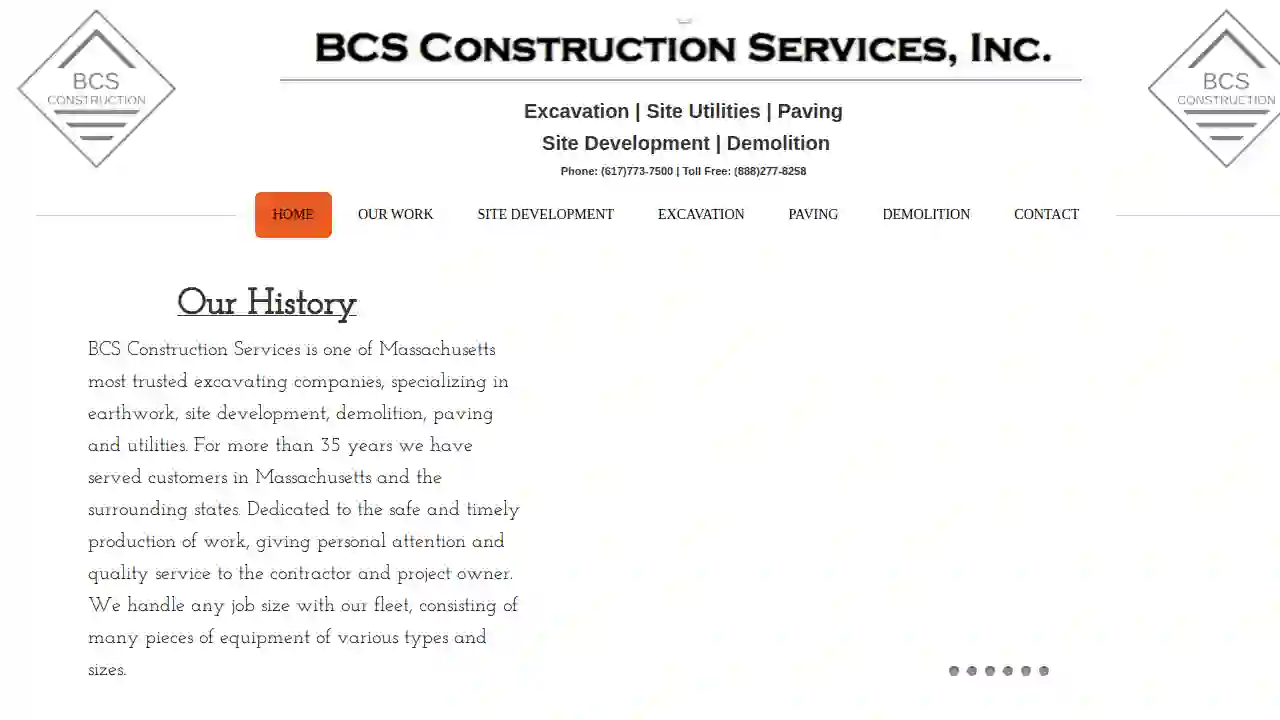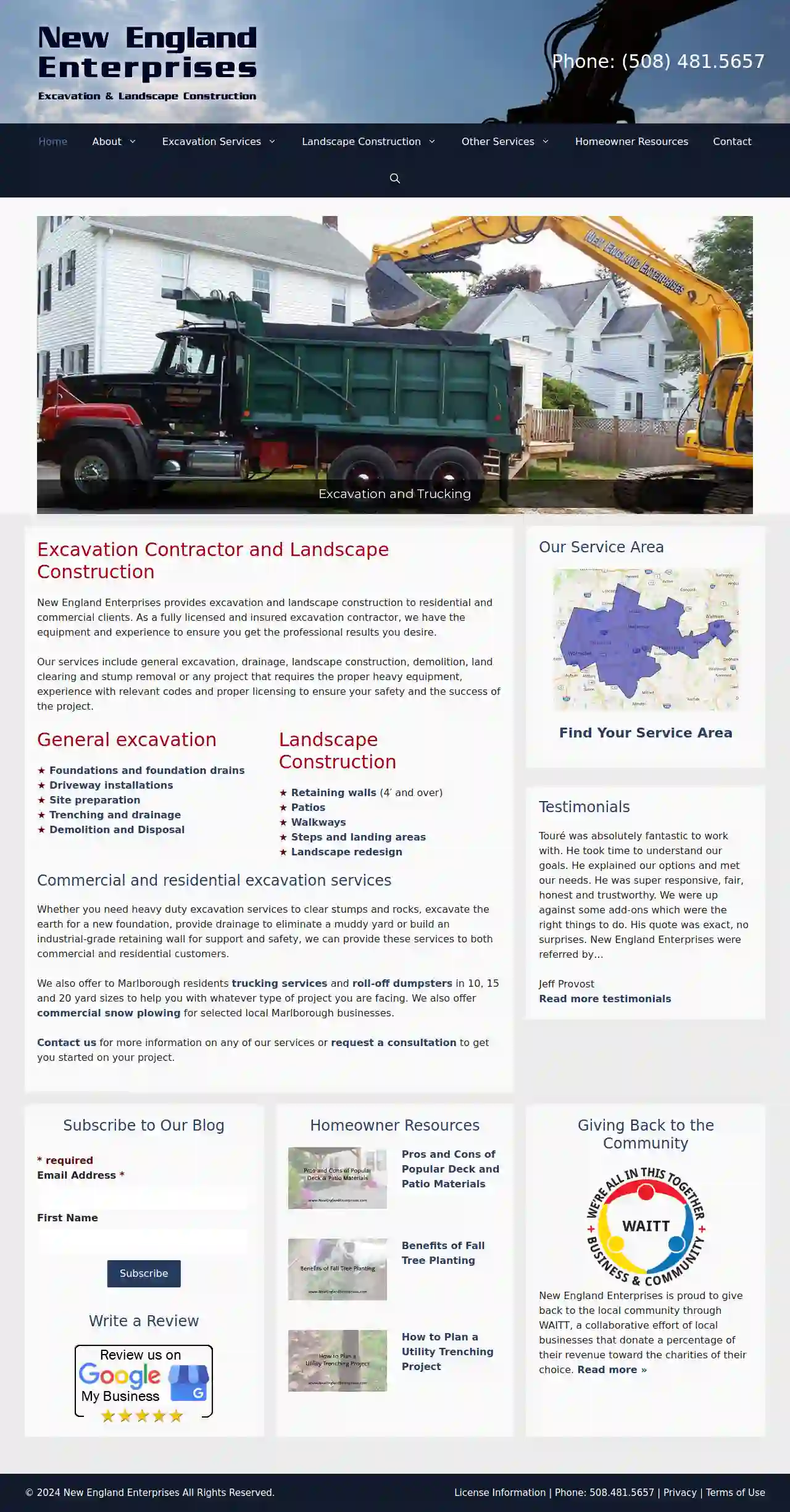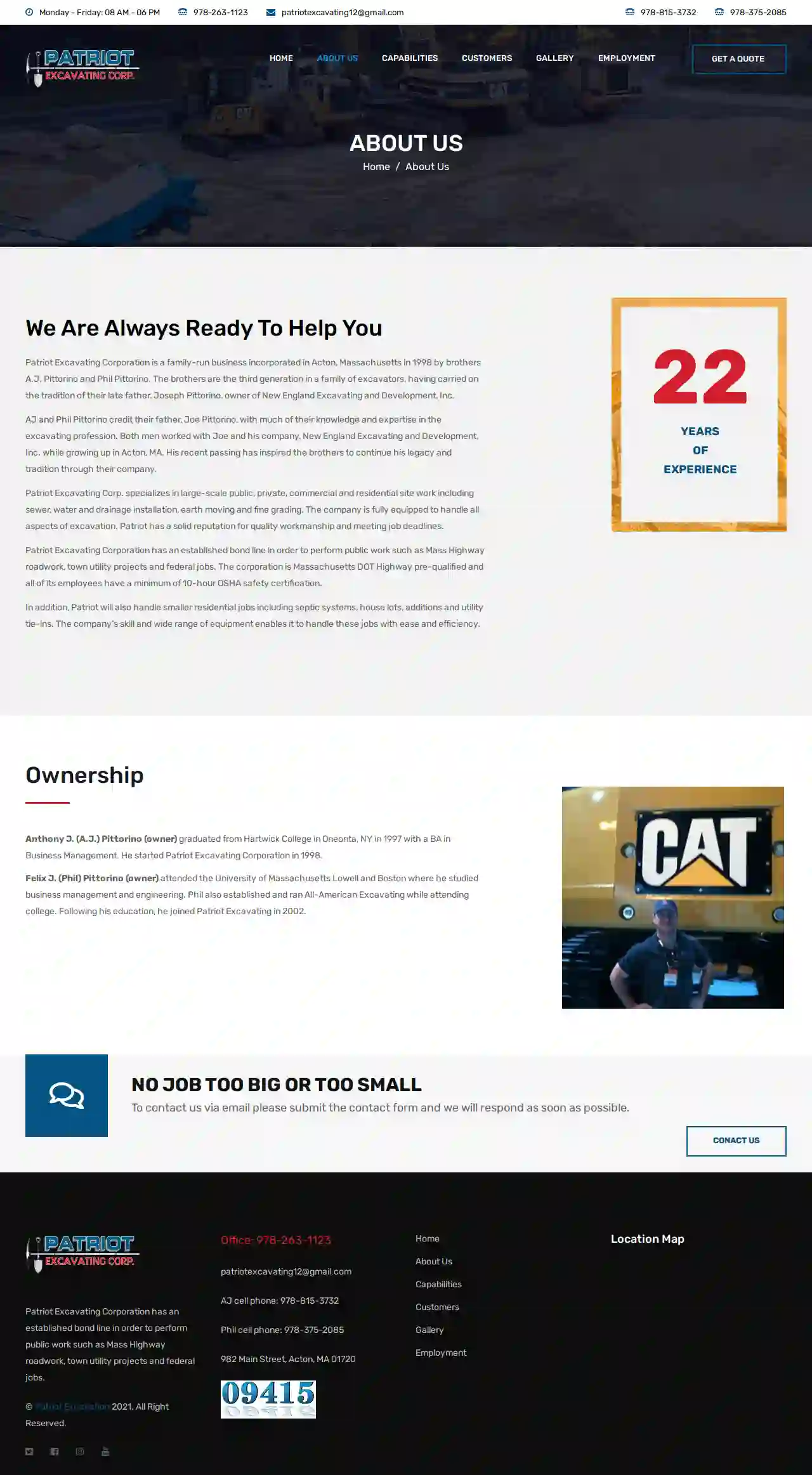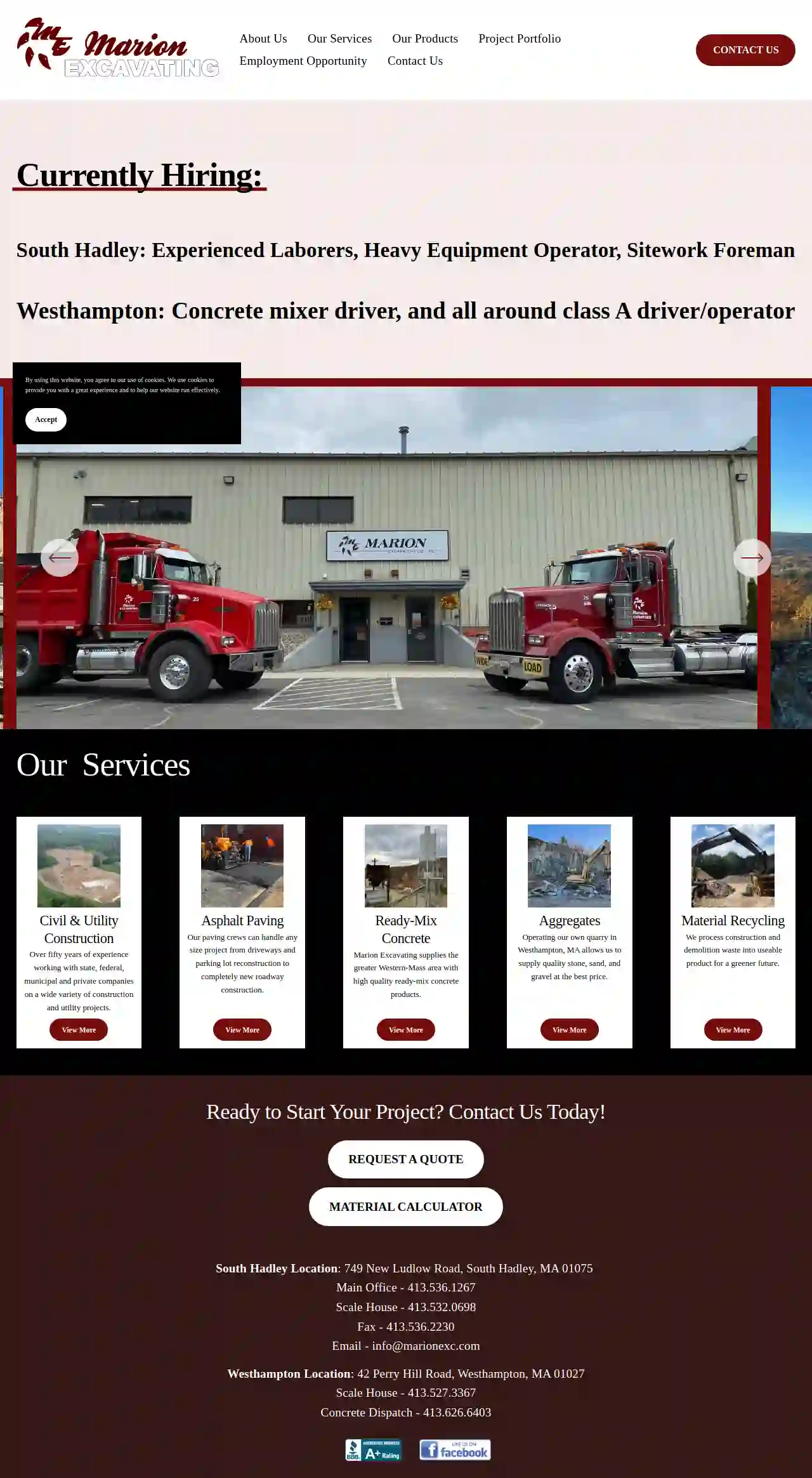Excavation Contractors Pinehurst
Best Excavation Companies in Pinehurst
Receive up to 3 Excavating Contractor quotes for your project today! Compare profiles, reviews, accreditations, portfolio, etc... and choose the best deal.

Boston Contracting Services
859 Willard Street, Suite 400, Quincy, 02169, USBCS Construction Services is a trusted excavating company in Massachusetts, specializing in earthwork, site development, demolition, paving, and utilities. For over 35 years, we've served customers in Massachusetts and surrounding states. We're dedicated to safe and timely work, providing personal attention and quality service to contractors and project owners. We handle any job size with our fleet of diverse equipment. Our Core Focus We specialize in a wide range of services, including: Roads Parking Lots Grading and Compacting Industrial Manhole & Catch Basins Municipal Paving Car Dealerships Demolition Our Services We offer a comprehensive range of services, including: Site Development Excavation Paving Demolition Utilities Licenses & Certifications BCS Construction Services holds various construction and engineering licenses in cities and towns throughout Massachusetts. We are licensed to perform all municipal and commercial work, and we hold licenses to operate interstate when necessary. Our team also holds various safety licenses from OSHA. Insurance & Bonding BCS Construction Services is capable of meeting most insurance requirements for mid to large-size commercial jobs. We also hold various bonds with cities and towns throughout Massachusetts. Other Services BCS Construction Services has provided expert witness testimony to assist in various construction and real estate-related activities. Please contact us directly if you are interested in this service.
- Services
- Why Us?
- Gallery
Get Quote
New England Enterprises
510 reviewsPlymouth, USExcavation Contractor and Landscape Construction New England Enterprises provides excavation and landscape construction to residential and commercial clients. As a fully licensed and insured excavation contractor, we have the equipment and experience to ensure you get the professional results you desire. Our services include general excavation, drainage, landscape construction, demolition, land clearing and stump removal or any project that requires the proper heavy equipment, experience with relevant codes and proper licensing to ensure your safety and the success of the project. Whether you need heavy duty excavation services to clear stumps and rocks, excavate the earth for a new foundation, provide drainage to eliminate a muddy yard or build an industrial-grade retaining wall for support and safety, we can provide these services to both commercial and residential customers. We also offer to Marlborough residents trucking services and roll-off dumpsters in 10, 15 and 20 yard sizes to help you with whatever type of project you are facing. We also offer commercial snow plowing for selected local Marlborough businesses. Contact us for more information on any of our services or request a consultation to get you started on your project.
- Services
- Why Us?
- Testimonials
- Gallery
Get Quote
Patriot Excavation
982 Main Street, Acton, 01720, USAbout Us Patriot Excavating Corporation is a family-run business incorporated in Acton, Massachusetts in 1998 by brothers A.J. Pittorino and Phil Pittorino. They are the third generation in a family of excavators, carrying on the tradition of their late father, Joseph Pittorino, owner of New England Excavating and Development, Inc. A.J. and Phil Pittorino credit their father, Joe Pittorino, with much of their knowledge and expertise in the excavating profession. Both men worked with Joe and his company, New England Excavating and Development, Inc. while growing up in Acton, MA. His recent passing has inspired the brothers to continue his legacy and tradition through their company. Our Services Patriot Excavating Corp. specializes in large-scale public, private, commercial and residential site work including sewer, water and drainage installation, earth moving and fine grading. The company is fully equipped to handle all aspects of excavation. Patriot has a solid reputation for quality workmanship and meeting job deadlines. Patriot Excavating Corporation has an established bond line in order to perform public work such as Mass Highway roadwork, town utility projects and federal jobs. The corporation is Massachusetts DOT Highway pre-qualified and all of its employees have a minimum of 10-hour OSHA safety certification. In addition, Patriot will also handle smaller residential jobs including septic systems, house lots, additions and utility tie-ins. The company’s skill and wide range of equipment enables it to handle these jobs with ease and efficiency. Our Team Anthony J. (A.J.) Pittorino (owner) graduated from Hartwick College in Oneonta, NY in 1997 with a BA in Business Management. He started Patriot Excavating Corporation in 1998. Felix J. (Phil) Pittorino (owner) attended the University of Massachusetts Lowell and Boston where he studied business management and engineering. Phil also established and ran All-American Excavating while attending college. Following his education, he joined Patriot Excavating in 2002.
- Services
- Why Us?
- Our Team
- Gallery
Get Quote
Uneed Home Improvements
4.618 reviews100 Summit Drive, Burlington, Boston, MA 01803, USWelcome to UNEED Paving & Masonry Corp We are an independent family business that will install your new driveway or patio to the highest possible standard, enhancing the appearance of your home or property and adding to its value. With over 20 years of experience working within the Boston, MA area, you may have seen our signs or sign-written vehicles on a road near you. We are a fully licensed and insured company. All our work is guaranteed. Quality asphalt, concrete & paver services we provide: Driveways Walkways Hardscapes Stone Steps Asphalt/Paving Pool Decks and Patios Stamped Concrete Retaining Walls Concrete Repair Asphalt Repair Parking Lots Overlays Stoops Waterfalls Private Roads Garage Slabs Foundations Curbs Stucco Work Power Washing Seal Coating Repairs Roofing Gutters Looking for Trusted Asphalt, Masonry & Concrete Paving Contractors in Boston, MA? Based in Boston, MA, we have been providing asphalt, paving and masonry services across Boston, MA and the surrounding areas for many years. We have vast experience working with both private and commercial clients.
- Services
- Why Us?
- Gallery
Get Quote
Modern Excavation
41 reviews387 Old Columbia Street, Adams, 01220, USModern Excavation, Inc. Modern Excavation, located in the beautiful Berkshires of Western Massachusetts, services residential as well as commercial customers in all areas of New England. At Modern Excavation you will experience professional work at an honest price, plus ...fast ...friendly ...courteous service. In addition to excavation, we offer many related services throughout the Berkshires, including the southern Berkshire areas of Lenox, Lee, Stockbridge, Becket, Otis, Great Barrington, Sheffield and more. Whether you are a year-round resident of the Berkshires, or a second home owner, we are here to assist you at all levels of service, including excavation, sewer and septic, site work, site & land clearing, waterline replacement, swimming pools, drains, trenching, pool removal, driveways, sand, gravel & top soil, concrete removal, septic system installations and Title V inspections. From simple projects to major repairs, you can count on us for ...Fast ...Friendly ...Courteous Service. Modern Excavation provides a wide range of services to both home owner's and contractors in all areas of New England. We offer Free Estimates and for your convenience we accept MasterCard, VISA and American Express.
- Services
- Why Us?
- Gallery
Get Quote
Consigli Construction Co Inc
4.720 reviews100 Cummings Center, Suite 2200, Beverly, USOur Story A history rooted in tradition, a future led with vision. Learn More > Who We Are A fourth generation company founded in 1905, Consigli offers the strength and stability of a large construction manager and the flexibility of a start-up. Our people love what they do and it shows—in their entrepreneurial spirit, in their desire to create environments that strengthen our communities, in the enduring relationships they build and in the pride they take in their craft. A Legacy Built on Accountability Consigli was founded upon the principles of dedication, hard work and commitment to craft. As we evolve, these things will never change. See the Story > Our People, Our Difference We don’t just assign people to projects—we challenge them to learn, lead, teach, problem-solve and rise to every occasion. Meet the People Who Make It Work > Projects That Move Us It’s our purpose to be builders—it’s ingrained in who we are. We create environments and relationships that strengthen our communities and enrich the ways people live, work, learn, heal and play. Let’s Get to Work >
- Services
- Why Us?
- Gallery
Get Quote
Deloury Construction Co Inc
4.25 reviews100 Burtt Road, Suite G01, Andover, 01810, USTrusted General Contractor and Excavator in Boston, MA The next time you need help with construction, excavation, or demolition services, count on Deloury Industries. Since 1963, our company has been accomplishing the most demanding construction challenges in the state and across our nation, ensuring our commercial and industrial customers meet the ever-changing demands of the marketplace. Why Choose Us? Our company is founded on the values of honest work, community engagement, and continuous improvement. With these values, strong leadership, and the dedication of our highly skilled employees, we've built on our history of success decade after decade. Moreover, we always aim to exceed your expectations in every project facet and bring life to your developments efficiently, safely, and within budget. Hire Us for Your Next Project Let our team make your project the next challenge we overcome. Our reliable, affordable, and trusted company is always ready to handle any of your construction projects. For inquiries about services, contact us and speak with our general contractor. We hope to be of service to you soon! Be Part of Our Team Jumpstart your career with us, and be part of a company that values its workers. Deloury Industries is now hiring truck drivers. To learn more about our career opportunities, get in touch with us.
- Services
- Why Us?
- Gallery
Get Quote
Marion Excavating Co., Inc.
4.413 reviews749 New Ludlow Road, South Hadley, 01075, USA regional leader since 1968 Servicing Massachusetts & Connecticut Operating since 1968 and incorporated in 1972, Marion Excavating has a long history of serving Western Massachusetts and neighboring areas safely, reliably, on schedule and on budget. Founding brothers Rich, Lee, and Russ Marion launched the business with one backhoe and a truck, quickly gaining a reputation for superior workmanship, safe practices and dependability. Over the years and now in its second generation, Marion Excavating has steadily expanded to meet growing customer demand while delivering the same level of high quality work and value. Fully Equipped, Fully Prepared Today, Marion Excavating takes on a comprehensive range of jobs, both large and small, for commercial, municipal, federal and residential customers. We have a professional staff of over 60 experienced operators, truck drivers and laborers; a large fleet of cutting-edge equipment fitted with the latest GPS technology; A construction recycling & materials facility; Quarry with aggregate processing capability; and a ready-mix concrete plant with delivery service. Marion Excavating is committed to delivering excellent results, which includes high-level environmental awareness and meticulous budget tracking. Contractors across the U.S. rely on our local expertise to fully manage environmentally sensitive projects: asphalt removal and replacement, site development, sewer lines, demolition, storm water management, erosion control and other critical jobs in the region. We have also successfully completed a number of wetland replication projects. Marion Excavating has an excellent track record of securing certification credits for LEED® compliant projects and we are MassDOT prequalified for highway construction, drainage, sewer and water projects.
- Services
- Why Us?
- Gallery
Get Quote
Orlando Excavation Corp.
54 reviews155 Main Street, Southborough, 01722, USWelcome to Orlando Construction Corp. We take a personal, customized approach with our customers. We are a renown local excavating contractor based in Southborough, MA with over 20 years of experience. Whether it’s a complete site grading, a new septic install, demolition of a large commercial or residential structure, installation of drainage or catch basins, a large retaining wall, a new asphalt parking lot or driveway or a large hardscape project, we take great care and pride in the work we do for you. We are equipped to meet all your project management needs and are committed to delivering the best in quality, service, safety and reliability our clients expect and deserve. The Right Choice… Renown Industry Leader Honest and Trustworthy Service Over 20 Years Experience Free Consultations Fully Licensed, Insured & Bonded We value our customers and are dedicated to serving you See What Our Clients Are Saying… “I am very pleased with the sitework Orlando Construction helped us with on our house lot! Thanks again to Orlando Construction for the great work and for answering all of our questions and concerns along the way. I will definitely be using Orlando Construction again and will recommend them without hesitation!” – Boxborough, MA
- Services
- Why Us?
- Our Team
- Testimonials
- Gallery
Get Quote
Structure Tone
52 reviewsStamford, USWho We Are We are a family of companies building amazing spaces across the US, Canada, UK and Ireland. History Founded in 1971, we have grown into an organization made up of over 4,700 employees across 54 offices.
- Services
- Why Us?
- Gallery
Get Quote
Over 22,076+ Excavation Companies on our directory
Our excavation contractors operate in Pinehurst and surrounding areas!
ExcavationHQ has curated and vetted Top Excavation Contractors in and around Pinehurst. Find a reliable pro today.
Frequently Asked Questions About Excavation Contractors
- Determining Soil Suitability: Assessing whether the soil can support the intended structure or load.
- Recommending Foundation Types: Advising on the appropriate foundation design based on soil characteristics.
- Addressing Drainage and Erosion Issues: Providing solutions to manage water runoff and prevent erosion.
- Evaluating Slope Stability: Assessing the risk of landslides or soil movement on slopes.
- Building on challenging soil types (expansive clay, loose sand, etc.)
- Constructing large or complex structures
- Excavating near slopes or retaining walls
- Addressing drainage or erosion concerns
- Sloped Property: Your property has a significant slope, making it prone to soil erosion or landslides.
- Creating Usable Space: You want to level off a sloped area to create a flat surface for patios, gardens, or other outdoor spaces.
- Preventing Damage: Erosion is threatening existing structures, driveways, or walkways.
- Landscaping Features: You're incorporating tiered gardens, raised beds, or other landscaping elements requiring soil retention.
- Clearly Define the Scope: Outline the project's goals, including the excavation area, depth, grade, and intended use.
- Obtain Necessary Permits: Research and acquire any required permits from your local authorities.
- Mark Utility Lines: Contact your utility companies to locate and mark underground utilities to prevent damage.
- Communicate with Neighbors: Inform your neighbors about the project's timeline and potential noise or disruptions.
- Prepare the Site: Clear any obstacles, such as vegetation, furniture, or structures, from the excavation area.
- Discuss Safety Protocols: Review safety procedures with the contractor to ensure a safe work environment.
- Topsoil Removal: Stripping the fertile topsoil layer from a site, often preserving it for landscaping.
- Trench Excavation: Digging long, narrow trenches for utilities (pipes, cables) or foundations.
- Basement Excavation: Removing earth to create a space for a basement beneath a structure.
- Pool Excavation: Digging a precise hole for installing a swimming pool.
- Roadway Excavation: Removing earth and preparing the ground for road construction.
- Demolition Excavation: Clearing debris and preparing the site after demolition.
- Channel Excavation: Creating channels for drainage or irrigation.
What is a soil engineer, and do I need one?
How do I know if I need a retaining wall?
What should I do before excavation starts?
What are the different types of excavation?
What is a soil engineer, and do I need one?
- Determining Soil Suitability: Assessing whether the soil can support the intended structure or load.
- Recommending Foundation Types: Advising on the appropriate foundation design based on soil characteristics.
- Addressing Drainage and Erosion Issues: Providing solutions to manage water runoff and prevent erosion.
- Evaluating Slope Stability: Assessing the risk of landslides or soil movement on slopes.
- Building on challenging soil types (expansive clay, loose sand, etc.)
- Constructing large or complex structures
- Excavating near slopes or retaining walls
- Addressing drainage or erosion concerns
How do I know if I need a retaining wall?
- Sloped Property: Your property has a significant slope, making it prone to soil erosion or landslides.
- Creating Usable Space: You want to level off a sloped area to create a flat surface for patios, gardens, or other outdoor spaces.
- Preventing Damage: Erosion is threatening existing structures, driveways, or walkways.
- Landscaping Features: You're incorporating tiered gardens, raised beds, or other landscaping elements requiring soil retention.
What should I do before excavation starts?
- Clearly Define the Scope: Outline the project's goals, including the excavation area, depth, grade, and intended use.
- Obtain Necessary Permits: Research and acquire any required permits from your local authorities.
- Mark Utility Lines: Contact your utility companies to locate and mark underground utilities to prevent damage.
- Communicate with Neighbors: Inform your neighbors about the project's timeline and potential noise or disruptions.
- Prepare the Site: Clear any obstacles, such as vegetation, furniture, or structures, from the excavation area.
- Discuss Safety Protocols: Review safety procedures with the contractor to ensure a safe work environment.
What are the different types of excavation?
- Topsoil Removal: Stripping the fertile topsoil layer from a site, often preserving it for landscaping.
- Trench Excavation: Digging long, narrow trenches for utilities (pipes, cables) or foundations.
- Basement Excavation: Removing earth to create a space for a basement beneath a structure.
- Pool Excavation: Digging a precise hole for installing a swimming pool.
- Roadway Excavation: Removing earth and preparing the ground for road construction.
- Demolition Excavation: Clearing debris and preparing the site after demolition.
- Channel Excavation: Creating channels for drainage or irrigation.